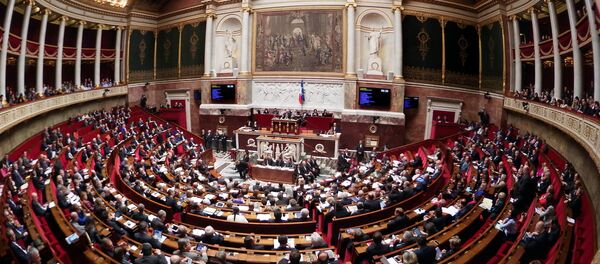MOSCOW (Sputnik) — President Emmanuel Macron's planned "structural reforms" will not be sufficient to boost France's global competitiveness, so the population will be angry and the country's leader will see his popularity decline, especially since most voters no longer feel like they owe lifelong loyalty to any one party, experts told Sputnik.
INSUFFICIENT REFORMS
Sebastien Cochard, a member of French right-wing National Front (FN) party, who was a candidate in the recent legislative election, said that the labor law reforms envisioned by Macron would only reduce household incomes, increase shareholders' profits and lead to a GDP decrease through cuts to overall consumption.
"The reforms of the Labor Code planned by Macron are 'structural reforms' deemed to create an 'internal disinflation' aiming at lowering labor costs and increasing French products competitiveness. But no reform will be enough to fill the competitiveness gap with Poland or China… The population of France will be legitimately angry and Macron's popularity will quickly evaporate," Cochard said.
"It will depend whether he is opened to negotiations with the trade union, CFDT, which is the one less opposed to him. The Communist-Parti de Gauche-oriented [The General Confederation of Labor] CGT will fight the reform in the streets," Camus said.
According to the expert, the workers said they were ready to negotiate if the president agreed to drop some of the more contentious points in his plans.
"In Parliament, the Communists and [Jean-Luc] Melenchon's party will be the voice of staunch opposition to this reform. [FN] also stands against it, but it does not have the political culture of going to the streets," Camus said.
"There is nothing like unquestioning loyalty in Western democracies nowadays. The time when people stuck with a political party for their whole life is definitely over. The voters shift from one party to another and are no longer bound by ideological loyalty," the expert said.
Camus also said that Macron has a firsthand experience from his time as a minister under former President Francois Hollande of how reforms can be "buried deep" in France unless implemented quickly.
"So Macron has a majority and once again, coming from out of nowhere, he achieved a remarkable result. He shall act carefully but on the other hand, he knows firsthand from his years at the Elysee [Palace] under [Francois] Hollande, that France is a country where reforms are so hard to implement that if you do not act quickly, your plans for reforms are often buried deep and for a long time," Camus said.
LOW TURNOUT
Camus praised Macron's achievements in winning the presidency and securing the majority in the parliament's lower house, but added that the low turnout at both rounds of the parliamentary elections remained a problem.
"President Macron won the Presidency with a wide margin despite the fact that he was not even a candidate one year ago, then he got an overall majority in the lower house with a political party that did not even formally exist 6 months ago… The problem with the very low turnout is huge. Among those who did not bother to vote, mostly the youth (18-25 years) and the working-class, there are many citizens who do not trust the institutions anymore and who will probably stay away from the polls for a very long time," the expert said.
"This [Macron's Republique en Marche party victory] is really astonishing and it tells much as to the incredibly bad situation in both the Socialist Party and the Republicains: both have killed themselves!" Camus said.
Cochard was running for the seat from the 11th constituency, which includes the French citizens abroad in a large number of countries in Asia, Australia and Eastern Europe. The seat, formerly held by Thierry Mariani, a member of The Republicans party, was won by Anne Genetet, the candidate of Republique en marche (REM).
"Macron's candidates, most of them novice in politics, received at the second round around 40 percent of the expressed votes, while the expressed votes (taking out white and void votes) represented only 38 percent of the electorate. Thus Macron's candidates collected only 15 percent of the votes of the electorate at the second round," Cochard said.
Camus remarked on the negative effect of power being increasingly given to the executive branch over the legislative one.
"What is really bad for democracy is that the institutions of the Fifth Republic tend to give more and more power to the Executive and less and less to Parliament. This trend was accentuated in 2002, when we switched from a 7 years to a 5 years presidential term and we decided that the general election would immediately follow the parliamentary one. As a result, the situation we had in the 1990s, of a president and a parliamentary majority being opposed, is no longer popular with the voters. Once they have voted for a Presidential candidate, they want him to have full power in the House," Camus said.
REM and its ally Democratic Movement party (MoDem) hold over 300 seats in a 577-seat National Assembly.






